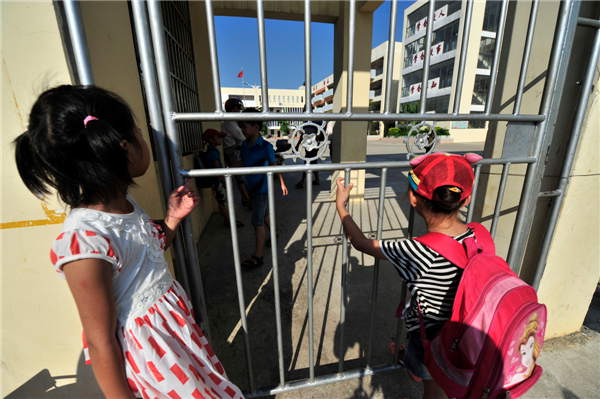
Food safety has become a top concern for consumers when they buy food or dine in restaurants, according to a survey released on May 16.
"Quality, price and brand are no longer primary concerns for Chinese consumers, following a number of food scandals in recent years," said Wang Tie, senior vice-president of Ecolab Inc, a US-based producer of disinfectant and food safety services.
According to the survey, conducted jointly by Ecolab and the Shanghai-based China Business News Group, almost 99 percent of participants would change their decisions on purchases because of food safety incidences.
The survey covered hundreds of food manufacturing, catering and retail chains in seven cities, through website research and face-to-face communication with the public.
Citing the survey, Wang said consumers' concern for food safety resulted from a lack of transparency in the food processing chain, especially in original material purchasing, production and quality inspection.
"A rising number of food scandals has greatly damaged consumers' confidence and changed their purchasing habits," Wang said.
For example, a milk scandal in 2008 prompted Chinese parents to lose faith in local formula brands and hoard foreign ones, Wang said.
Sanlu Group, a manufacturer based in Shijiazhuang of Hebei province, was found to have sold milk powder contaminated with melamine, an industrial compound used to create plastic that makes the milk appear protein-rich.
On Wednesday, Chinese Premier Li Keqiang urged strict market supervision and harsh penalties to ensure food safety following recent scandals involving adulterated mutton.
"A healthy development of the food industry needs positive collaboration from the enterprises, government, industrial associations, media and consumers," Wang said.
In cooperation with other professional health institutes, Ecolab also launched an award focusing on food manufacturing, catering and food retail industries on May 16 in Guangzhou, the capital of Guangdong province.
The award has introduced principles of high sensitivity toward public health, well-organized internal management mechanisms, good and reliable raw material supplies, strict production supervision, staff self-discipline, control on upstream and downstream companies, as well as corporate credibility and responsibility.
Luo Yunbo, a professor at the College of Food Science and Nutritional Engineering under China Agricultural University, said consumers' concern about food safety was a result of information asymmetry between food manufacturers and the public.
"China's food industry has improved a lot in the past several decades. We need to build a trust system in food between consumers and manufactures," Luo said.
Luo also said consumers should obtain well-rounded information from authoritative channels, rather than simply be informed by media reports.
"Also, manufacturers should take an active approach to inform the public of how their foods are produced. Retailers should also tell consumers how they purchase the products," Luo said.
Citing some scandals reported last year, Luo said media reports related to food safety issues should be based in experts' views and other authentic and reliable resources.
"Through our investigations, we have found that some reports are false. Such reports have tarnished the reputation of a company, and most importantly, damaged consumers' confidence of food safety, which will be harmful for China's food industry," Luo said.


















![]()
